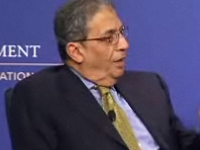Registration
Thank you!
You will receive an email confirming your registration.
George Mitchell is the “personification of an honest broker,” and his appointment as U.S. Mideast envoy raised hopes in Arab capitals that the United States is rededicated to its role as a balanced mediator in the Arab-Israeli conflict, said Arab League secretary-general Amr Moussa. Moussa also called on the Obama administration to pressure Israel to halt settlements in the Palestinian territories and to formally commit to a two-state solution.
In a dialogue with David Ignatius from the Washington Post on February 25, Moussa highlighted lessons learned from past attempts to resolve the Arab-Israeli conflict: Open-ended talks are ineffective; and future peace negotiations must include concrete deadlines and written commitments from both sides. Talks are futile without an Israeli settlement freeze, Moussa stressed, since settlement expansion alters the political boundaries policy makers are negotiating. A peace deal will remain a distant hope until Israel can muster the political will to pursue a viable Palestinian state, he said.
Moussa also discussed other key Arab League priorities, which include:
- Fostering discussion with Israel: Moussa praised the progress made in Syria-Israeli talks (stalled since the January Gaza war) and called for Lebanon-Israeli talks after Lebanon’s parliamentary election in June 2009, possibly with the U.S. as guarantor.
- Promoting national unity in Iraq: The biggest threat to Iraq’s future stability is widespread sectarian division. Strengthening national institutions – the police force, for example – will help foster a national identity. Allowing the sectarian divide to persist will “destroy Iraq,” Moussa noted, and invite interference by more powerful neighbors.
- Preventing a nuclear arms race in the Middle East: The Arab League advocates a nuclear-free zone in the Middle East that encompasses both Iran and Israel. The international community should not tolerate nuclear weapons in Israel while pressuring Iran to terminate its program. Moussa noted that the IAEA has not determined that Iran is pursuing nuclear weapons, but warned that if it does a regional arms race is likely; Egypt and Saudi Arabia may seek nuclear weapons in response.
- Finding a modus vivendi with Iran: Middle Eastern nations must find ways to work with Iran to develop a sound regional security arrangement that promotes Iraqi stability and prevents an arms race. Support from Tehran is also crucial for finding a resolution to the Arab-Israeli conflict.
- Resolving the conflict in Sudan: The Arab League and the African Union continue to urge the Security Council to suspend International Criminal Court prosecution of Sudanese President Bashir, They contend the trial is a distraction from working toward peace through negotiations between factions in the multi-faceted conflict.
Although President Obama’s election generated enthusiasm on the Arab street and hope among Arab policy makers, the secretary-general emphasized that the Middle East is waiting for the United States to assume its vital role as a constructive, balanced facilitator of dialogue in the region.
